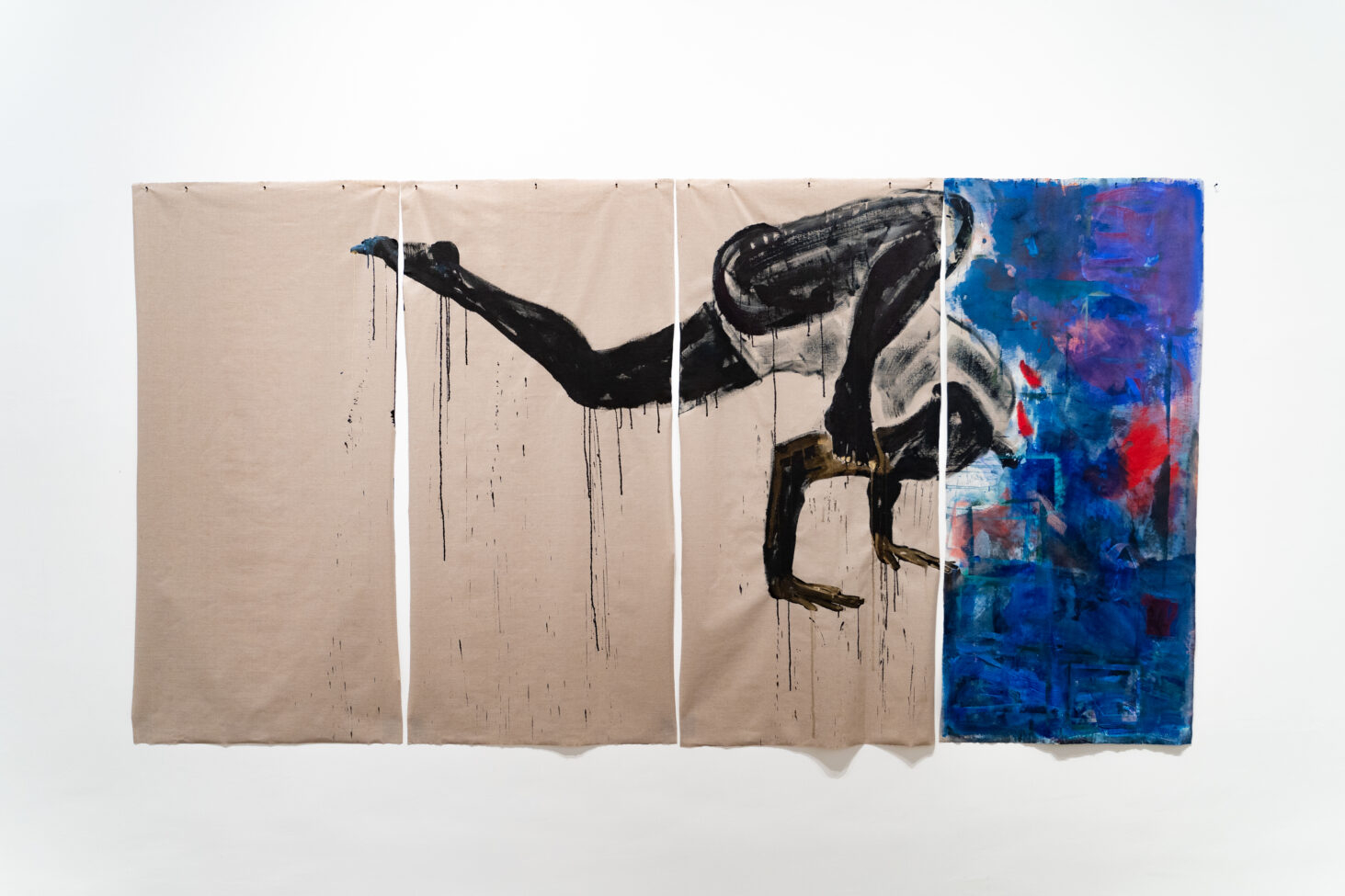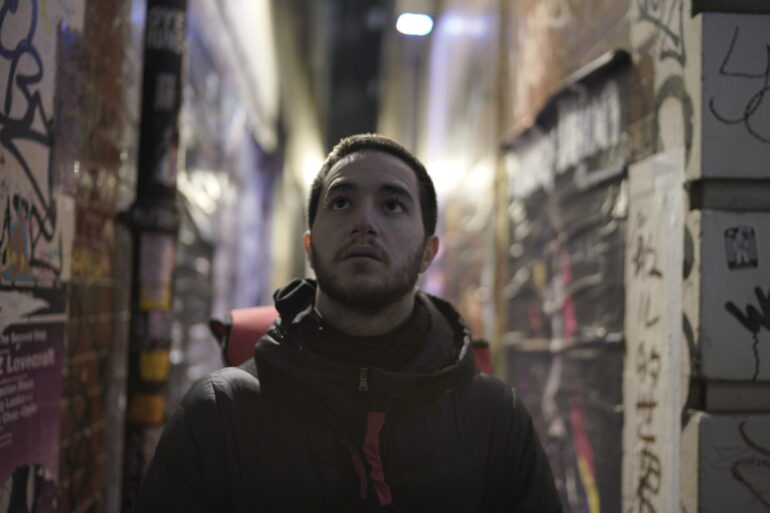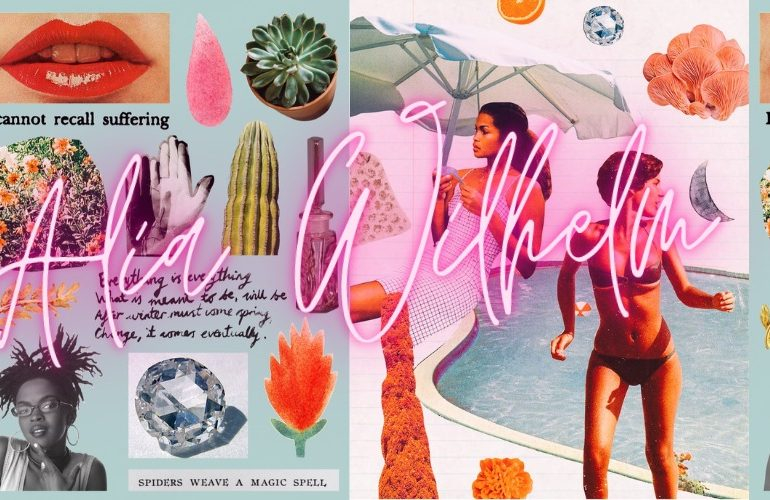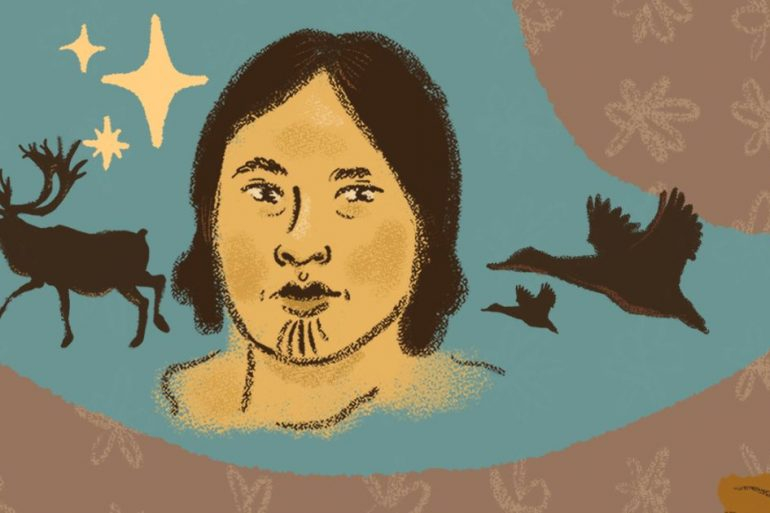Tiwani Contemporary’s autumn exhibition, lalala ha! by Nigerian-American artist Wura-Natasha Ogunji, is a dynamic fusion of paintings, drawings, and performance art in Lagos. This unique exhibition invites viewers to interact and reflect as it constantly transforms, serving as a memoir of Ogunji’s experiences in the city. It challenges conventional perspectives on space and encourages us to see, feel, and know ourselves and interactions with space in new ways.
During one of my gallery visits, I sat with Wura in a spot where we could view most of her pieces. We discussed her work, inspiration, lessons, and the chaos of life in Lagos.
Interestingly, while we chat, a group of young people in the room seem more focused on taking photos of themselves in the space than engaging with the art. They appeared oblivious to the artist’s presence completely.
Nevertheless, the space provided a stunning backdrop for their photos. Wura found this dynamic intriguing, observing how people interacted with the art and the space. It also encouraged me to think about the various ways people engage with art and space – some prioritise the art, some the space, and for others, it’s a combination of both.
Rethinking space
In lalala ha!, a dynamic series of ever-evolving scenes unfolds, embracing a non-linear narrative reflecting Wura’s connection to Lagos, a city in constant motion where innovation and quick problem-solving are the norm.
This exhibition thrives on change, with the artworks on display in a perpetual state of transformation, some even revealing dual identities when flipped over. What you see at the beginning is not what awaits you at the end, echoing Lagos’s ever-shifting essence also.
Wura’s aim in crafting this exhibition extends beyond spatial dimensions; it reshapes our perceptions of the gallery itself. Tiwani Contemporary’s overlooked windows are given due attention, with the high walls adorned with artworks creatively presented using pulleys and cords that draw the gaze upward. This integration seamlessly merges the expansive gallery walls into the artistic experience. Large, imposing artworks coexist with smaller, more intimate pieces, inviting viewers to approach them and engage with the art up close.

Lagos, a perfectly imperfect local
Understanding Lagos as a perpetually evolving city is helpful in providing insight into how Wura’s experiences here inspire her art. She describes this dynamic: “You have the sense of, ‘okay, I get this city.’ But then you go out and see something, and you’re like, ‘oh my gosh, I’ve never seen that.’ I like this idea that nothing is constant, there’s change. There’s improvisation. There are rules about everything, but there’s a constantly imperfect, perfect way of moving through space.”
I share this sentiment wholeheartedly. Every time I step out in Lagos, it never fails to surprise me. In fact, it can be quite overstimulating. Whether it’s the people and their interactions, sudden potholes causing miles-long traffic, or a new police checkpoint where a uniform and a gun appear to bestow outsized authority, Lagos keeps you on your toes. The city’s dynamic nature ensures that no two days are alike. You can’t predict when an insecurely loaded trailer might topple or a Danfo bus could spark a heated traffic gridlock due to an accident.
This ‘perfect, imperfect’ dynamic sparked Wura’s desire to challenge artistic conventions. She aimed to disrupt the traditional gallery format, reflecting on it, saying, “Instead of everything framed on the walls at the same height, I wanted to disrupt this and think about how the gallery could reflect the local.”
This perspective grew from a conversation Wura had with the late Bisi Silva, a respected figure in Nigeria’s art scene and the founder of the Centre for Contemporary Arts (CCA). The pair discussed the importance of grounding artistic practice in the local context, resisting the need for validation from the West.
Wura underscores this point, stating, “you don’t know all the theoretical possibilities of what we can create when we centre the local.” This principle resonates throughout the creative community, encouraging artists to draw inspiration from their immediate surroundings and infuse their work with authenticity.
However, defining the ‘local’ in a dynamic city like Lagos presents a fascinating challenge. Navigating Africa’s largest mega-city is a complex dance through a landscape marked by gridlocked traffic, unreliable public transportation, and relentless urban hustle. The city’s infrastructure struggles under the weight of its growing population, exacerbated by the high cost of living and transportation expenses following the fuel subsidy removal.
Lagosians adapt with resilience, recognising that this perfectly imperfect chaos is the norm. Everyone seemingly understands the need to adapt and falls in line.
This ‘perfectly imperfect’ approach extends beyond Lagos’ physical terrain; it also applies to the realm of local knowledge. The colonial legacy has left local ways of knowing in a state of flux, without definitive historical textbooks rooted in indigenous paradigms. In the same way Lagosians navigate the city’s complexities, we navigate our understanding of ourselves, bound by the same ‘perfectly imperfect’ paradigm.
Wura and I chat about the fascinating intersection where art serves as a potent conduit for expressing local wisdom and ideas. It’s a remarkable avenue because it thrives on imperfections, enabling us to convey historical imaginings without claiming them as absolute facts. In this fusion of imperfection and creativity, Lagos becomes a canvas, and its people become storytellers of a perpetually evolving local narrative.
Like I Said, Like I Told You Before – none of this is okay!
Amidst Lagos’ vibrant, perfect, imperfect chaos, we encounter a complex space that mirrors Nigeria’s socio-political landscape.
Rapid urbanisation exposes stark income disparities, crumbling infrastructure, and a nationwide housing crisis. This wealth gap divides the privileged and marginalised, while a growing youth population faces a challenging job market. These issues are entwined with Nigeria’s political woes – corruption, governance deficiencies, and power struggles.
In light of these challenges, Wura raises a crucial question: “What’s really going on?” She contends, “everyone’s like, ‘Oh, just manage. Just figure it out. We can manage now.’ but should we really manage this? It’s just not okay.”
Her creative expression draws from personal experiences, challenging prevailing narratives and urging us to uncover the hidden complexities behind the façade of a supposedly ‘perfect, imperfect,’ and see that it is not always ideal.
Subscribe to shado's weekly newsletter
Exclusive event news, job and creative opportunities, first access to tickets and – just in case you missed them – our picks of the week, from inside shado and out.

In her artwork Like I Said, Like I Told You Before, Wura employs vivid symbolism: a figure marked with cuts intertwined with vibrant red threads. This symbolises the struggle to convey one’s experiences when unheard, evoking frustration akin to the pain of existing in Lagos, where people inquire if you are “okay” even as you grapple with the harsh realities. She reflects, “I’m not okay. None of this is okay. Why would it be okay? Yes, we’re brilliant, stylish and boisterous. Yeah, we know how to party. But what happens after the party? For me, this tension is a lot.”
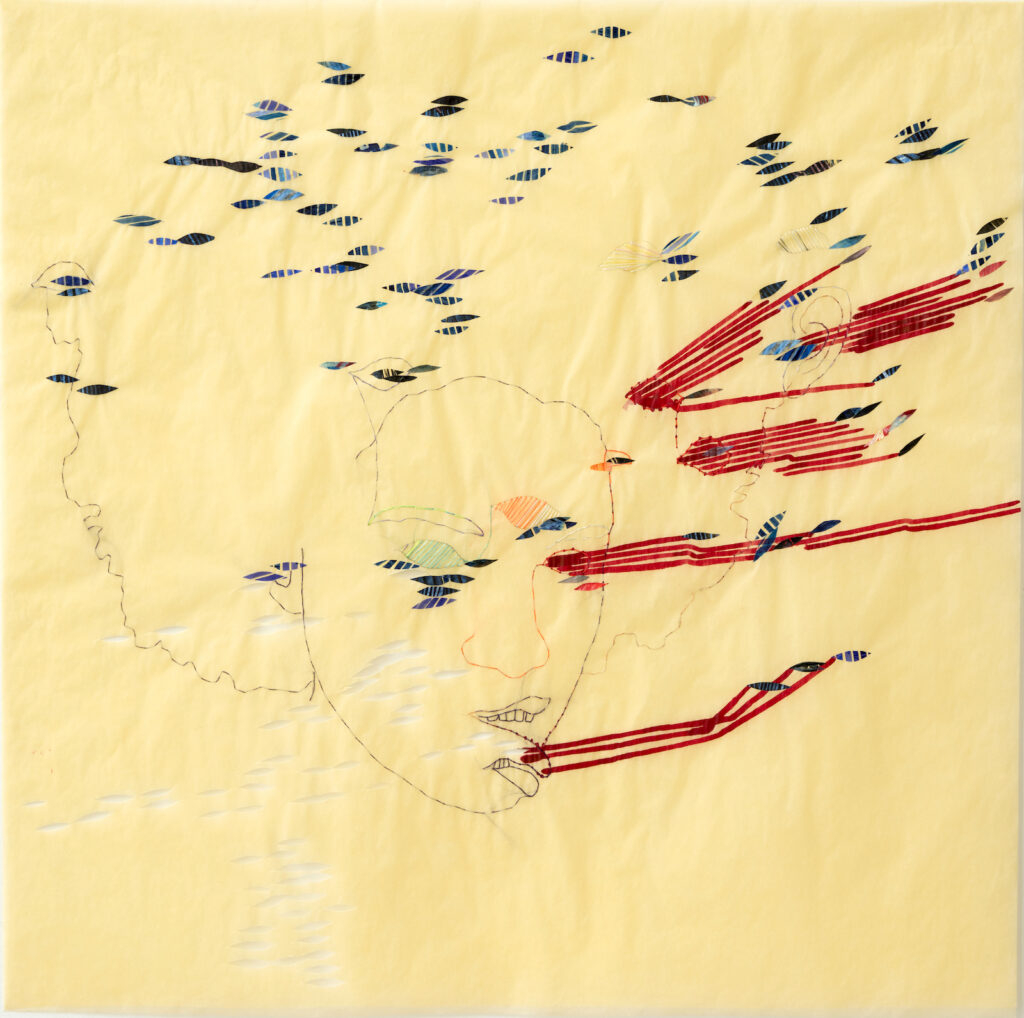
Next to Like I Said, Like I Told You Before, The Shit and the Sunrise uses its vibrant palette to explore the balance between despair and hope, echoing Wura’s insights. Lagosians and Nigerians, despite adversity, showcase remarkable resilience in thriving markets, arts, and entrepreneurship. In Wura’s words, “Despite it all, we must continue to write, dream, and rise above.”

Starting with the Self
In the quest to navigate the complexity of the shit and the sunrise that we have to experience in Lagos, a question emerged in our discussion: how do we embark on a creative journey driven from within, rather than yielding to external pressures in a dominating world?
The arts, particularly those emerging from marginalised communities, often find themselves entangled in politicisation and commercialisation. This tugs them towards either conformity or resistance against external forces. Unfortunately, this external influence often disrupts the natural flow of creativity, detouring it from an inside-out approach. Bisi Silva’s call to root creativity in the local context, with the body as the ultimate vessel, gains relevance in such intricate terrains.
Wura astutely observes, “I think artists and queer people, including trans people, are some of the most brilliant people on the planet. I think we have this incredible ability to see things from many sides to know that every single person has a complexity within them that is constantly changing and constantly reforming. I think artists can go into this alternate space and really go there.”
Initiating one’s creative journey from a personal vantage point becomes a wellspring for potent artistic expression that sidesteps external hegemony while simultaneously offering commentary. As Wura aptly puts it, “it’s not simply in the interest of changing the world, but in the interest of going deep because it’s our responsibility as artists to go deep… I think we can go deeper, especially given what people have experienced here [Lagos]. And especially given our histories and culture. There’s so much brilliance, beauty and excitement.”
Wura mentions a question she has been grappling with: “What would you do if the white man didn’t exist? What would you create?” Her drawing teacher’s wisdom guides her pursuit: “You’re trying to learn to draw like yourself. And so you do all this stuff to get closer to something that’s yours. You’re learning all these techniques to find your own way.”
You made so many mistakes!
Wura’s artistic journey in lalala ha! challenges conventional norms by emphasising self-exploration and embracing imperfections and mistakes. Upon entering Tiwani, viewers are immediately confronted with art boldly declaring, “you made so many mistakes.” Wura’s philosophy centres on experimentation and the acceptance of her flaws.

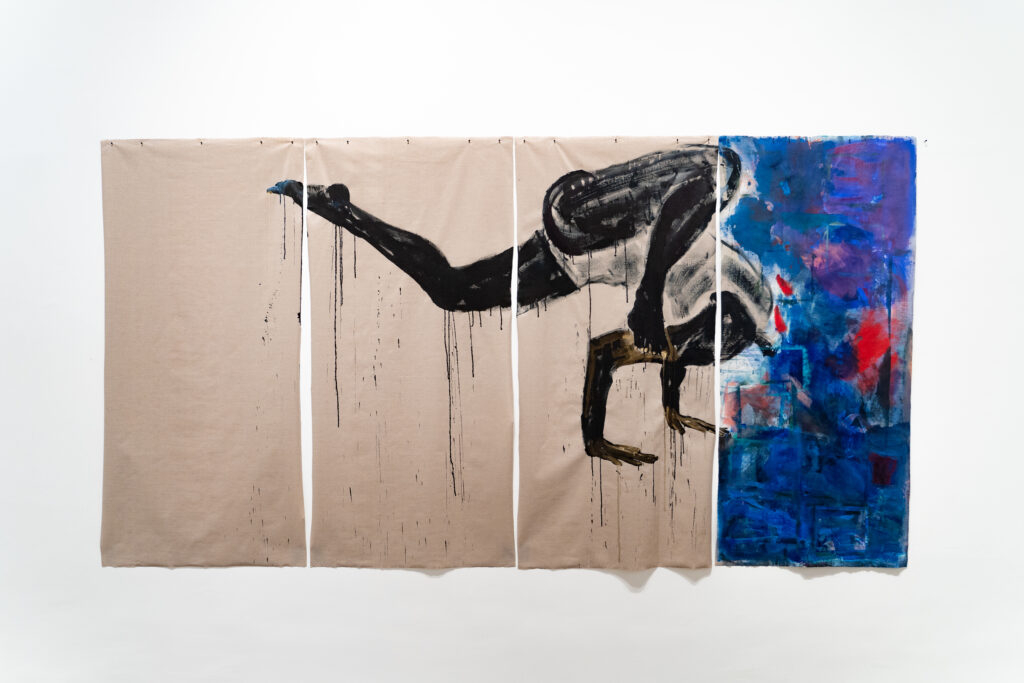
“The flaws are really beautiful,” she says. She shows me the marks from when the painted linen was folded from her travels, and for Wura, this imperfection is beautiful and a part of the art. “The fold is a beautiful thing,” she muses.
I will admit that I see this. Before understanding the rationale behind its presentation, Keep Your Head in the Clouds was one of my favourite pieces, flaws and all. These flaws and folds offer a glimpse into uncharted creative territories.
Wura believes great things can emerge from tragedy, inconvenience, and the unknown. Her fascination with the unknown drove her transition from photography to drawing and painting. The transition was daunting, yet it was precisely the unknown that beckoned her. “The things we don’t know are the beauty,” she declares.
Wura’s philosophy challenges traditional narratives, advocating for coexistence between the self and the space in the act of creation. This results in an authentic narrative of oneself within that space.
In lalala ha!, Wura invites us to witness the beauty that emerges from her audacious journey, where mistakes, imperfections, and the unknown guide her artistic evolution. It’s a testament to embracing the self, flaws and all, and celebrating the beauty that unfolds through creativity.
What can you do?
- Visit Wura-Natasha Ogunji’s Website
- Read The art of Wura-Natasha Ogunji by Bimbola Akinbola
- Watch Wura Natasha Ogunji Interview: The Kissing Mask
- Watch Wura Natasha Ogunj Interview: Beauty in the Streets of Lagos
- Watch Journey of an African Colony on Youtube
- Read more articles by Adebayo HERE
- Watch Bigger Than Africa on Netflix

